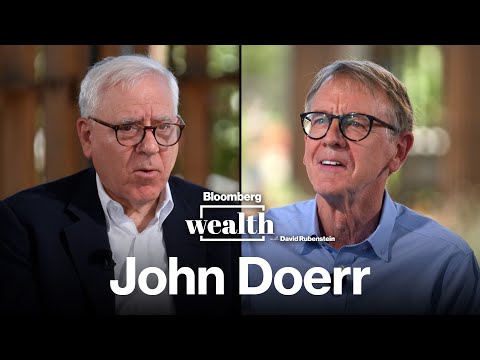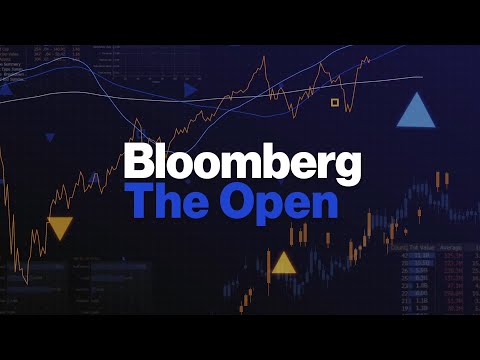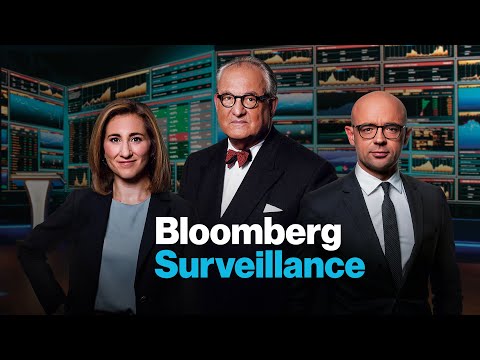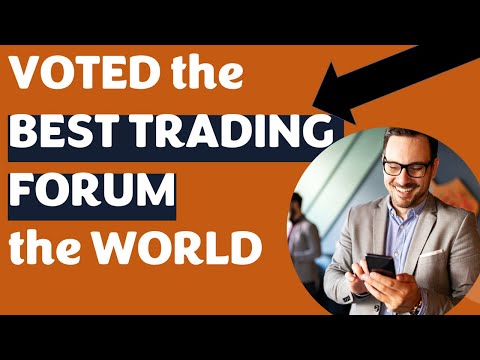Bloomberg Wealth: John Doerr

I think venture capital is not a scalable business. I think it's a service industry. Matt Miller do more than anyone thinks possible. With less than anyone thinks possible. I love entrepreneurs. I love serving them and helping them build teams and amazing companies to solve big problems. How do you become the world's most successful venture investor. I think it's important for a successful venture of investors to be entrepreneurs. John Door obviously made that connection. He was an early employee at Intel before defying its president Andy Grove and leaving for a job in venture capital. He said in venture capital. That's a real estate business. It's not a real
business. John joined Kleiner Perkins in 1980 when it had just were partners managing about 100 hundred million dollars. He made his mark with early and controversial bets on two little known startups Amazon and Google. Google is controversial within the partnership and within the industry and it turned out to be an epic idea in company. Now John serves as chairman of Kleiner Perkins which operates 32 funds with more than six hundred and seventy five investments. But John's focus has moved beyond the
Internet revolution to the climate revolution. I went around kicked up a lot of controversy declaring that the Internet had been under hyped. I say the same thing today about the climate revolution. You're one of the most famous venture capitalists in the world in part because you had a lot of deals that were spectacular. Two of the most spectacular were Google and Amazon. So when you saw the guys who created Google and you saw Jeff Bezos do you say these are going to create these guys going to create world class companies or do you say maybe they'll get my money back. What did you think of the first time you met them. So I met Jeff when he was 30 years old and he and I were both computer science
kinds of geeks. And Amazon had a business plan. It was growing to be the world's best bookseller online. And so I invested I think it was eight million dollars for 15 percent of Amazon. And Jeff and I set out to build an amazing world class team. And he had a vision which is true to this day that if he had the broadest selection with the most affordable prices and the best customer experience that flywheel he could get to grow by obsessing on the customer. And yes I believe he was successful. No I had no idea that it would be worth one point two trillion dollars today. But the same thing happened a few years later when I met two 21 year old Stanford University dropouts Larry Page and Sergey Brin. And in that case I invested eleven million dollars for 11 percent of the company which was very controversial. They had no business plan no revenues. And I
asked Larry Page. He sat across the table from me. I said Larry how big do you think this can be without batting an eyelash. She said 10 billion. And I said surely you mean market cap right. He said no I'm talking revenues. He said to me John you have no idea how much we're going to be able to improve search and how important search is for finding all the world's information and services. Let's talk about your background for a moment before we get into
the climate issues on your background. Where are you. Where are you from. Originally born and raised in St. Louis Missouri. What did your father do. My father was an engineer and entrepreneur. He was a great great dad. And he was my hero. So you went off to school at Rice. How did you happen to go to Rice. Well I knew I wanted to go to a great engineering school and Caltech and M.I.T. were too far away from St. Lewis. But I could drive to rice and I fell in love with the place. Right. So after you graduated then what did you decide to do. Well I knew I wanted to start a company with friends
so I decided that I'd try to learn something about business. I got an MBA degree from. Harvard took a lot of courses in my spare time at M.I.T. which was great and fortunately landed a summer job. Between my first and second year at a new small chip company by the name of Intel that brought me to Silicon Valley the Valley of the Heart's Delight. These orchards and to Stanford and to where I've lived and worked ever since. So you work for Intel for a while and a
leader. When you were there ISE I understand was Andy Grove. And Andy Grove when you said to him I'm going to go work at a venture firm that you say that's a great thing to do. No he said and he had this way of reaching inside your chest pulling out your heart and holding it in front of you. And he said John Door don't you really want to be a general manager in a technology company. And I said well sure. And and he said well why don't you come run Intel's ad this non-existent software business. And I said no I don't I don't think that's right. I think I think what I'm going to do is join Kleiner Perkins and work on venture capital. And he said venture capital. That's a real estate business. That's not a real business. So you joined Kleiner
Perkins. It was then a relatively smaller firm than it is today I assume. Sure. There were four partners Eugene Kleiner Tom Perkins Frank Caufield and Brooke Byers. And it managed a modest amount of money then perhaps 100 hundred million dollars. So did you ever think that the world of venture capital would become the explosive world of technology that's now become at that time. No I didn't. But I didn't think much about that because what I really wanted was for Kleiner Perkins to commit to back me when I found a company that I would start with friends. And they made that commitment because they'd done that several times before. The business plan for Genentech was written inside Cleaner's office the business plan for hybrid tech monoclonal antibodies inside cleaner's office. So Eugene and Tom were a typical
venture capitalists. They were really themselves engineers and operators and successful entrepreneurs in the venture world. You're committing relatively small sums compared to the buyout world per person per deal. What do you have to get all of your partners to agree. Or can you just say I'm going to do this and I hope you'll support me.
So inside Kleiner and it may be different in other firms. You don't have to have everyone agree. And indeed some of our best investments were very controversial. Google was controversial within the partnership and within the industry was one hundred million dollar valuation when a company with no revenues and no business plan and founders with no business experience in it turned out to be an epic idea in company. So you've written that one of your young daughters said you at one point. What are you doing about climate change. And she kind of propelled you into doing something more than you have been doing. Is that story apocryphal. That's entirely true. You remember when you saw Al Gore's first
movie An Inconvenient Truth. Well I took my family and some friends to see that. And then we went home for dinner and had a discussion. Some of my Republican friends at the time said it looks like the world is getting warmer but we're not sure it's manmade. The science wasn't so clear then. But when it came to my 15 year old daughter Mary David she looked straight at me and she said Dad I'm scared and I'm angry. Your generation created this problem. You better fix it. And the room went silent. I had no idea what to say or even what to do. And so from that my partners and I set out to learn more. We traveled the world.
We went to the Amazon. We saw biofuels in Brazil. We went to China to win solar thermal in the Mojave Desert. And we crawled lots and lots of labs and began gradually over three funds to invest in disruptive entrepreneurs who wanted to address this problem. We put about a billion dollars and 70 companies over three funds. And last I checked those investments were worth about three billion dollars. So OK not off the charts but seven of our
eight solar companies were crushed by policies from the Chinese government. We learned a lot. We had a lot to learn. And now there's a resurgence I think of entrepreneurial academic and investor interest in solving this problem because Mary is still scared and still angry. I'd like to help entrepreneurs solve the climate crisis and build durable important companies across the economy.
I met with John Doar on the Stanford campus a night at the movies was the seed for what became a school on sustainability. Our ability to live is what is at stake. You remember when you saw Al Gore's first movie An Inconvenient Truth when it came to my 15 year old daughter Mary David she looked straight at me and she said Dad I'm scared and I'm angry. Your generation created this problem. You better fix it. The room went silent. John Doar didn't stay silent for long. He investigated green energy all over the world. More importantly
he and his wife gave Stanford a one point one billion dollar gift and persuaded others to donate almost 600 million more resolve the door school of Sustainability. Stanford's such a great institution. And their plan to address climate was so thoughtful and ambitious that I and my family felt compelled to back. Stanford's first new school in 70 years opened this fall. It's three part structure includes academic departments interdisciplinary institutes and a sustainability accelerator. We are in fact in many ways kind of reimagining academia and the accelerated is all about solutions of problems that are going on. These are technology solutions that that can be scalable. These are policy solution nonprofit. He's a launchpad for big ideas including people for the roughly 1000 undergraduate and graduate students in the school's inaugural class. There's
little question that the jobs will be there when they graduate. The International Labor Organization estimates that 24 million jobs worldwide could be created by the green economy by 2030 alone. People need to be trained in critical thinking of how to look at sustainability. Challenges in John and Haroon are aligned on their goals. I don't think there's a single
institution by itself that can address climate change and sustainability issues. Importantly David we need lots of great climate schools like we have lots of great medical schools. And so I think this is leading to a lot of interest all around the world. After. So recently you wrote a book about climate change and the importance of doing something about it. I have it here. It's God's speed and scale. What's the essence of the book. It's actually not a book. It looks like a book for what it is is a plan. Because the climate movement has had lots of goals for a long time. But what this is is an engineer's plan for how we get.
From fifty nine gigatons per year of carbon pollution to net zero by 2050 and the plan is available for free on the Web site speed and scale dot com. There are six components to this plan. Andy Grove would call these objectives. Jim Collins would say they're big Harry S. schools but they are first to electrify our transportation. Use batteries and electric vehicles instead of diesel and gasoline for transport. Second decarbonise our grid generate our electricity from wind and solar and safe nuclear instead of from fossil fuels. Third fix our food systems voluntarily eat somewhat less meat. Fix our agricultural systems and reduce food waste. Fourth protect nature. That means stop burning the rain forest and doing deep ocean trawling on the seabed. Fifth and this is a
hard one cleanup industry. How we create the steel and the concrete that we need for a growing planet is a huge source of carbon emissions and a hard problem to solve when we've done as much emission reduction as we can for these first five. There are still going to be some remaining carbon emissions that we have to remove either through trees natural means or direct air capture which is what they call mechanical trees. All told the speed and scale plan takes us from zero to
fifty nine gigatons by 2050 and importantly halfway there by 2030. We have just seven and a half years to get this done in time. And so the plan includes for accelerants ways to make sure that we get it done fast. Those are winning the politics and policy turning movements into more than protests making them real actions innovating doing more research on the new. So we'll lower the costs for what we have now and innovate for the new. Now and the new. And then finally invest to invest like crazy to get this transition successful. So let's suppose I live in India or on China. I'm a citizen of those countries. I say well you and the United States you polluted the world for a long time. We're still a developing countries. We want the right to develop
our economies and we shouldn't be having the same standards that you have. What do you say to that argument. I'd say they're right. And I also say that this is a problem that we all have. We all have to solve together. The unions right now emit far less carbon per citizen than we do. Historically the US is the world's largest emitter of carbon pollution. Currently China is
the largest but we're the wealthiest country in the world. And so we've got to go first. We've got to prove that this can be done without ruining the economy. It takes only about 2 percent of GDP to make the necessary investments. And then we're gonna have to. Together with China and Europe help the developing world fund this transition. And you think that's realistic in
the near term. I think it can be done with a plan. We've had climate goals for a long time but we haven't had is a plan that's realistic. Time bound pragmatic. And that's what you're holding in your hands. So my thinking has been over the years that many people don't support climate change agendas because I think in the end it's going to cost them more money. If we make changes and secondly they might lose their job. How do you respond to those concerns. Well let's talk about both the jobs and the money. The first is between now and 2030 there are going to be twenty five million new high paying jobs created around the world. And every country should strive and want to get those jobs for their citizens. So there's maybe four million fossil
fuel based jobs that would disappear. Those stakes are pretty pretty clear now. The next question is what is the cost. What is the investment we're going to need to make. And the estimates are around. A trillion dollars per year. That's what the IEA estimates 2
percent of global GDP and what's on the table is who are going to be the leaders in the great new industries of the future. And suppose President Biden says you know John this is really difficult. I need more help in Washington. Can you come and serve in my cabinet or do something to really make this effort stronger than it currently is. Would you say yes to that. That would be a very telling request.
What about your investors. They would say no John please don't leave. Right. I would have to wait. Can I be more helpful outside or inside the administration. But your goal as a venture investor was to get good returns and produce good companies and they create jobs. But now you are in the mode to some extent of trying to change the world in the way you think is better. Do you find your different kind of person as a result of this. And do you find that people like you more because of this or they'd like to less because of this. I don't know if they like me or not but at the start of the Internet revolution I went around kicked up a lot of controversy declaring that the internet had been under hyped.
I say the same thing today about the climate revolution. I think the move to a new clean energy economy is not some kind of green kumbayah. It's a revolution. There's gonna be real winners real losers. It's imperative that we do this. And as Larry Fink said. There will be a thousand private unicorns companies worth a billion dollars working in climate. I think what we're seeing here at Stanford is that climate science is going to become the new computer science to where all the young people want to work for all the right reasons. My partners and I decided not to back even Musk. That's probably
the worst investment decision of all time. Let's suppose I'm a Stanford graduate or most likely a Stanford dropout because that seems to be better. My dropped out of Harvard I dropped out of Stanford and I have a business plan and I want to do something on the Internet or something and climate change. And I send an email to John Door saying I have a good idea. Can I get a meeting with you. How many of these proposals you've got a week and how do you sift through the ones you can actually meet with. So our team at Kleiner Perkins gets three
thousand proposals a year. We read them all. We take meetings with about one out of 10. Three hundred of them. And we'll make in an average year 40 or 50 new investors. So if I'm one of the people one out of 10 that gets a meeting with Kleiner Perkins and John Door what's the best way for me to get the money that I want from you is to say I have all the answers I've thought through these things is that they have a great slideshow presentation. What is it that actually convinces you
to give money to somebody. So we did a survey. We looked backward retrospectively at for 20 years at the largest most successful investments. What distinguished them from the average Kleiner company the average Kleiner investment by the way returns its capital forty five percent of the time. So a majority of the time they don't. They
fail. But one of the one of the bedeviling things about venture capital is you can make many many many times your money on a very successful investment and you can only lose 1 times your money. Those five factors David were the following. Technical excellence. Strategic focus on a large existing or new market. Outstanding management. Reasonable financings and finally a sense of urgency. Those were the five distinguishing outstanding factors
and no new venture possesses all those. And so telling your story about how your technology is excellent and you're going to transform this market and being open to help in filling out some of these other needs is what will get us over the finish line. So do you ever have regrets. I have regrets on deals that I miss the past and I passed on Facebook when Mark was in Harvard. I didn't think Jeff Bezos was gonna make it. I told him that when I first met him. You ever have regrets on deals you didn't do all the time. And the deals I should have found that I didn't even see when I first came to Silicon Valley. I hung out at Stanford on the second floor of Margaret Jackson. All down that hall was Andy Ductal Shyam who founded Sun Microsystems. John Hennessy who became president of Stanford founded MIPS Jim Clark of Silicon
Graphics. What I didn't do is go down into the basement where Len Len and Sandy were starting Cisco. So that was a miss on my part. More recently I had the opportunity to invest in an electric vehicle company and the conventional wisdom was venture capitalists but not to invest in electric vehicle companies not new car companies at all. There've been 400 new car companies in the nation's history. Every one of them. But one has gone bankrupt. But I was still very attracted to the market and we had the choice of backing a brilliant car designer by the name
of Henrik Fisker or ambitious slightly crazy entrepreneur by the name of being on musket test. Well we made the wrong decision. But Tesla did very very well and so did electric vehicles. When I make a mistake I only think about it for the next 10 or 20 years. How long does it take for you to get over these things. Well I don't obsess on these but I won't ever forget. And today when you agree to back somebody do you monitor them carefully. Do you help them and you open doors for them. What do you actually do other than give them money. It depends what what what what they need what will help the most. Usually it's recruiting and growing the team. We're in a world wide rate race
to get the most talented people to believe in and pursue the vision. I like to say David ideas are easy. Execution is everything. So what do you do to tell them that they can do a better job on climate. If it's not their main focus I suppose it's a computer company or a smart phone company of some type. You try to get them to focus on climate change as much or not their concern as much. No I try to embrace their plan their agenda and they're coming to us saying what they want to do about climate because they know to attract the talented workers that they're competing for and to retain them. They need to be more than mercenaries. They must be missionaries. So if somebody is looking at you now and says Art you're one of the most
successful venture investors in the world. What would you say to young people that the qualities it takes to be a great venture investor. You have to have a lot of courage. You have to be willing to do things that other people say shouldn't be done. What is it that makes a great venture investor. Well there's different formulas for different people. My my good fortune was
to have a technical background to listen very carefully to to learn to be inquisitive and to be service oriented. You know I think venture capital is not a scalable business. I think it's a service industry. And in most service industries the winners the McKinsey's of the world are a lot like the CEOs that they serve. They dress like them. They talk like them. And so I think it's important for a successful venture investors to be entrepreneurs to have a real connection with the challenges that teams are facing when they're trying to build businesses.
2022-08-30 06:58


